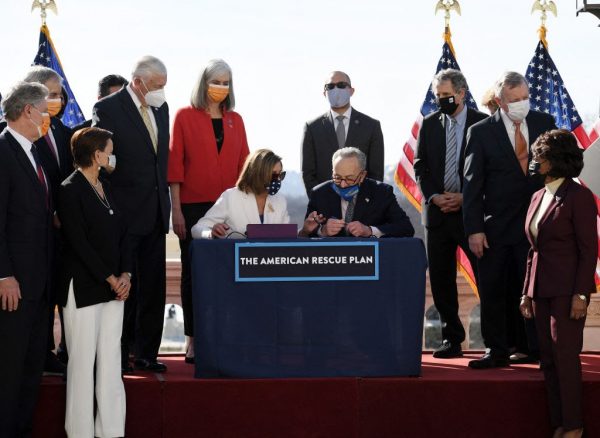The House of Representatives, sans Rep. Jared Golden (D-ME), passed the final version of the Biden administration’s $1.9 trillion American Rescue Plan spending bill on March 10. The Act will now be sent to President Biden for final signing and become United States law.
The Act’s journey through Congress has been a partisan affair, with the House rejecting all but 2 of 286 Republican amendments to the gargantuan 591-page bill. The Senate, meanwhile, accepted only three Republican amendments in a 24-hour session on March 6. The final version included the removal of Biden’s promised $15 minimum wage hike, a reduction of the “raise” given to the unemployed of $400 per week to only $300 per week and an extension of the additional unemployment insurance to Sept. 6.
The revised Act was passed by the Senate 50-49 after Republican Dan Sullivan of Alaska had to leave the marathon session early to attend a family funeral. The final passing in the House was by a margin of 220-211, with all Republicans voting in opposition and all Democrats, except for Jared Golden, voting in favor.
Jared Golden the sole Democrat ‘nay’
In a statement, Jared Golden, who also voted against the bill in its original run through the House, said he voted against his Democrat fellows because the American Rescue Plan Act does not fit his principles, “This bill addresses urgent needs, and then buries them under a mountain of unnecessary or untimely spending,” he said in a Statement.
Between the money spent in 2020 and today’s package, we are already nearing $6 trillion in new spending in less than one year. This amount of new spending is unprecedented since World War II
Success
You are now signed up for our newsletter
Success
Check your email to complete sign up
Rep. Jared Golden (D-ME)
“In reviewing the bill in its full scope, less than 20 percent of the total spending addresses core COVID challenges that are immediately pressing: funding for vaccine distribution and testing, and emergency federal unemployment programs. I support these portions of the bill wholeheartedly and believe we should do more for the people hardest hit by the pandemic by continuing to extend unemployment programs until economic indicators show they are no longer necessary.”
Golden says the remaining 80 percent of the bill falls into two categories. The first he described as a “series of spending provisions that duplicate ongoing COVID assistance programs that Congress has already funded or are poorly designed and wasteful of public resources,” including additional rental, food, and child care assistance, aid to state and local governments, schools, small businesses, and $1,400 checks for individuals making more than $75,000 and couples making $150,000.
Jared Golden described the second category as “a series of policies worthy of consideration under regular order but that do not belong in an emergency spending bill,” such as a one-year expansion of the Child Tax Credit, a two-year enhancement under the Affordable Care Act, and pension reform.

Golden says he appreciates these policies on their own but feels they should not be included as riders in a pandemic relief spending bill.
“Between the money spent in 2020 and today’s package, we are already nearing $6 trillion in new spending in less than one year. This amount of new spending is unprecedented since World War II,” said Golden. “It’s not unreasonable to take a step back and ask ourselves if we are making every dollar count and picking the right priorities.”
The United States’ national debt increased from approximately $23.6 trillion in March of 2020 to a high of $27.9 trillion by February of 2021. According to the Federal Reserve, the U.S. Gross Domestic Product is approximately $21.5 billion as of Q4 2020.
President Biden is scheduled to sign the American Rescue Plan into law on Friday, according to USA Today.















